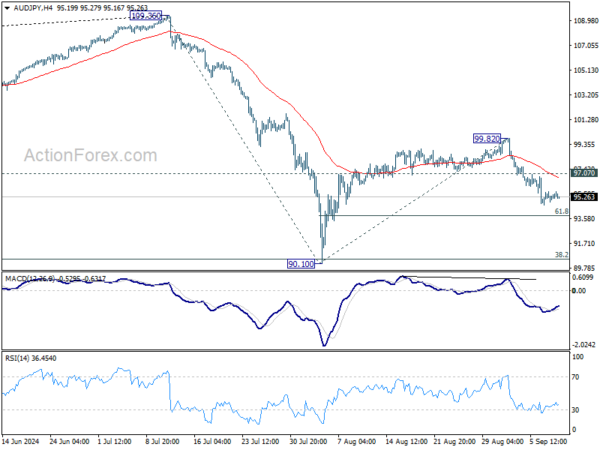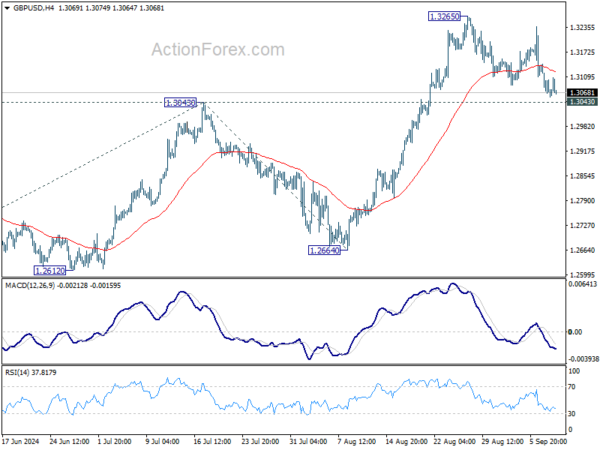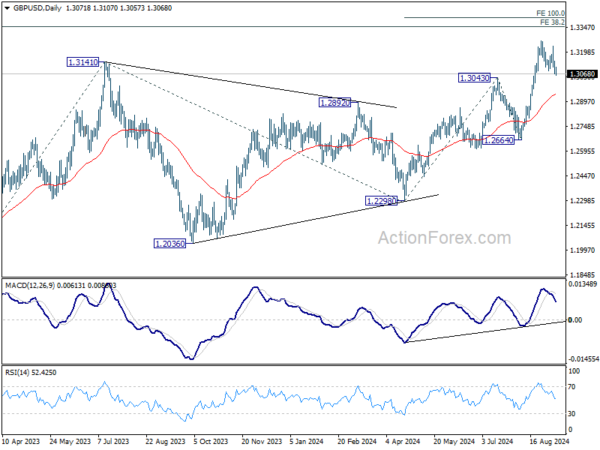Trading in the forex markets remained relatively subdued today, with limited momentum across major pairs. Sterling saw a brief uptick following robust UK employment data, but the rally quickly lost steam. The data did little to alter expectations that BoE will likely keep rates unchanged next week and wait until November to reassess its stance. However, upcoming key releases, including tomorrow’s GDP data and next week’s inflation figures, could still shift market expectations.
Elsewhere, Swiss Franc and Yen are regaining some strength today as recent pullbacks stall. Both currencies remain in a consolidative phase, with traders awaiting further cues from broader risk sentiment. On the weaker side, Canadian Dollar is the worst performer for the day, followed by Euro and Sterling, while Dollar and Australian Dollar are holding a middle ground.
Technically, AUD/JPY turned into sideway trading this week but lacks momentum for a solid recovery. Rise from 90.10 has likely completed at 99.82 already. Deeper fall remains in favor as long as 97.07 resistance holds, for 61.8% retracement of 90.10 to 99.82 at 93.81. Decisive break there will raise the chance of resumption of whole fall from 109.36, and target 90.10 low next.
In Europe at the time of writing, FTSE is down -0.25%. DAX is down -0.46%. CAC is up 0.16%. UK 10-year yield is up 0.0023 at 3.864. Germany 10-year yield is up 0.0106 at 2.181. Earlier in Asia, Nikkei fell -0.16%. Hong Kong HSI rose 0.22%. China Shanghai SSE rose 0.28%. Singapore Strait Times rose 0.46%. Japan 10-year JGB yield fell -0.0001 to 0.895.
BoC Governor Macklem warns of persistent inflation pressures amid global trade slowdown
BoC Governor Tiff Macklem in a speech today raised concerns about the long-term implications of slowing globalization on inflation, indicating that price pressures may remain elevated for some time. Macklem highlighted that “with globalization slowing, the cost of global goods may not decline to the same degree,” which could result in upward pressure on inflation.
Macklem also pointed to the ongoing risks of trade disruptions, noting that such disruptions could increase the “variability” of inflation, making it harder to control price stability. He drew on lessons from the pandemic, emphasizing that supply shocks, especially when the economy is overheated, can have an outsized impact on inflation volatility.
The BoC governor acknowledged the challenges supply shocks present to central banks, stating that “monetary policy can’t stabilize growth and inflation at the same time.” This, he added, requires central banks to focus on risk management, balancing the risks of rising inflation against the downside to economic growth.
UK payrolled employment falls -59k in Aug, unemployment rate ticks down to 4.1% in Jul
In August, UK payrolled employees fell by -59k or -0.2% month-on-month, marking a significant contraction. Meanwhile, median monthly pay increased by 6.2% yoy, an acceleration from the previous month’s 5.5%. Claimant count rose by 23.7k to 1.792m, below the expected 95.5k rise.
For the three months leading up to July, unemployment rate fell slightly from 4.2% to 4.1%, in line with expectations. Wage growth showed signs of further slowing, with regular earnings (excluding bonuses) rising by 5.1% yoy, down from 5.4%, matching market expectations. Total earnings, including bonuses, rose by 4.0% yoy, a deceleration from the previous month’s 4.6%, and just below the forecast of 4.1%.
Australian Westpac consumer sentiment falls to 84.6, economic concerns deepen
Australia’s Westpac Consumer Sentiment Index saw a marginal decline of -0.5% mom in September, falling from 85.0 to 84.6, reflecting the ongoing pessimism that has gripped Australian consumers for more than two years. According to Westpac, this persistent negativity shows “no real signs of lifting,” with key indicators pointing to growing anxiety about the country’s economic outlook.
Sentiment around economic conditions for the next 12 months dropped from 83.3 to 81.2, while unemployment expectations rose sharply from 133.5 to 138.4, signaling growing concerns about job security. However, the interest rate expectations index saw some relief, falling from 135.5 to 123.8, as consumers became less worried about further rate hikes.
Westpac noted that the focus among consumers appears to be shifting. “While cost-of-living pressures are becoming a little less intense and fears of further interest rate rises have eased, consumers are becoming more concerned about where the economy may be headed and what this could mean for jobs,” the report highlighted.
Australia’s NAB business confidence falls to -4, conditions fairly clearly below average
Australia’s NAB Business Confidence fell from 1 to -4 in August. Business Conditions also declined, dropping from 6 to 3. Trading conditions dipped by 2 points, while profitability slid by 1 point. Forward orders remained unchanged at -4.
NAB Chief Economist Alan Oster commented on the data, noting that “conditions are now fairly clearly below average compared to the history of the survey,” underscoring the broader weakness in the private sector as the economy slows.
The decline in the employment gauge is particularly notable, as it “suggests the period of very strong private sector labor demand seen throughout the post-Covid period may be coming to an end,” Oster added.
China’s exports grow 8.7% yoy in Aug, imports up only 0.5% yoy
China’s exports grew by a robust 8.7% yoy to USD 308.7B in August, surpassing market expectations of 6.5% yoy growth. However, this impressive figure is largely attributed to base effect, as exports contracted by -8.8% yoy during the same period last year.
Exports to key regions such as the US, the EU, and the ASEAN all posted solid gains. Notably, exports to the EU saw the largest increase, growing 13% yoy.
In terms of imports, China’s intake from the US rose by 12% yoy, while imports from the EU showed a decline. Imports from ASEAN grew by 5% yoy. Overall import growth remained weak, increasing by just 0.5% yoy compared to the expected 2.0% yoy.
China’s trade surplus widened significantly, rising from USD 84.65B in July to USD 91.02B, exceeding expectation of USD 83.9B.
GBP/USD Mid-Day Outlook
Daily Pivots: (S1) 1.3046; (P) 1.3095; (R1) 1.3121; More…
No change in GBP/USD’s outlook and intraday bias remains neutral. Further rise is expected with 1.3043 resistance turned support intact. On the upside, firm break of 1.3265 will resume larger up trend to 100% projection of 1.2298 to 1.3043 from 1.2664 at 1.3409. However, firm break of 1.3043 will turn bias back to the downside for deeper pullback.
In the bigger picture, up trend from 1.0351 (2022 low) is in progress. Next target is 38.2% projection of 1.0351 to 1.3141 from 1.2298 at 1.3364. For now, outlook will stay bullish as long as 1.2664 support holds, even in case of deep pullback.
Economic Indicators Update
| GMT | Ccy | Events | Actual | Forecast | Previous | Revised |
|---|---|---|---|---|---|---|
| 22:45 | NZD | Manufacturing Sales Q2 | 0.10% | 0.70% | 0.80% | |
| 23:50 | JPY | Money Supply M2+CD Y/Y Aug | 1.30% | 1.50% | 1.40% | |
| 00:30 | AUD | Westpac Consumer Confidence Sep | -0.50% | 2.80% | ||
| 01:30 | AUD | NAB Business Conditions Aug | 3 | 6 | ||
| 01:30 | AUD | NAB Business Confidence Aug | -4 | 1 | ||
| 03:00 | CNY | Trade Balance (USD) Aug | 91.0B | 82.1B | 84.7B | |
| 06:00 | GBP | Claimant Count Change Aug | 23.7K | 95.5K | 135K | 102.3K |
| 06:00 | GBP | ILO Unemployment Rate (3M) Jul | 4.10% | 4.10% | 4.20% | |
| 06:00 | GBP | Average Earnings Including Bonus 3M/Y Jul | 4.00% | 4.10% | 4.50% | 4.60% |
| 06:00 | GBP | Average Earnings Excluding Bonus 3M/Y Jul | 5.10% | 5.10% | 5.40% | |
| 06:00 | EUR | Germany CPI M/M Aug F | -0.10% | -0.10% | -0.10% | |
| 06:00 | EUR | Germany CPI Y/Y Aug F | 1.90% | 1.90% | 1.90% | |
| 08:00 | EUR | Italy Industrial Output M/M Jul | -0.90% | -0.10% | 0.50% | |
| 10:00 | USD | NFIB Business Optimism Index Aug | 91.2 | 93.6 | 93.7 |



